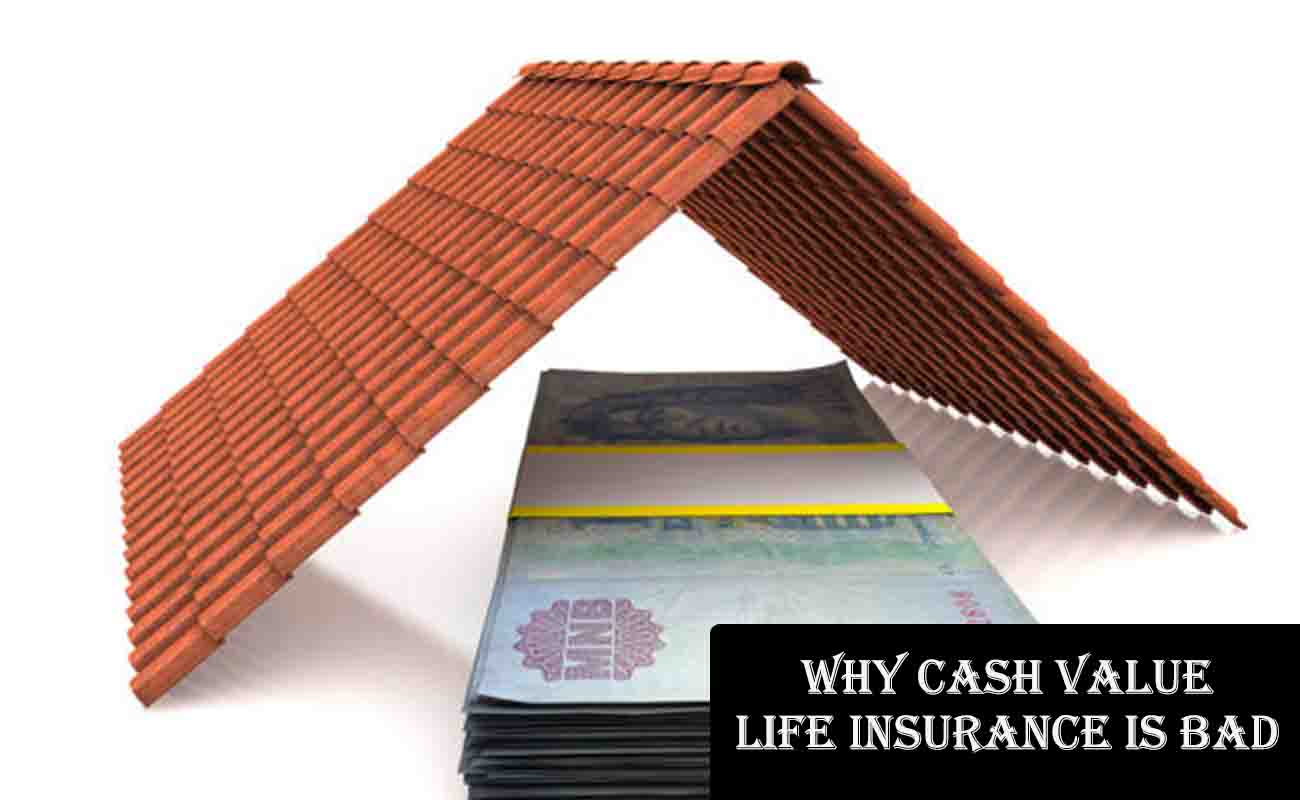Why is Cash Value Life Insurance Bad? You’ve probably heard the argument between cash value and term life insurance. I’ve been evaluating financial plans and assisting people in making better financial decisions for years, so I want to explain why cash value life insurance might not be your greatest option. At the end of this article, you will understand the drawbacks of cash value life insurance, which is supported by real-world instances and professional opinions.

One kind of permanent life insurance that combines savings and death payouts is called cash value life insurance. I think that cash value life insurance frequently has major disadvantages for the majority of people, even though it can appear nice to have both life insurance and a savings account in one.
RECOMMENDED >>> Navy Federal Personal Loan Credit Score Requirements
What Is Cash Value Life Insurance?
Let me define cash value life insurance before we discuss its disadvantages. A savings or investment component is added to life insurance coverage with cash value life insurance. Whole life, universal life, and variable life insurance are popular varieties.
On the surface, this may seem enticing. After all, you’re creating a nest egg and obtaining insurance coverage. But if you look more closely, you’ll find some significant problems that make it a poor financial decision for the majority of people.
Why Cash Value Life Insurance is Bad
A policy that combines life insurance with an investment or savings component may seem like a fantastic offer when you hear about cash value life insurance. However, having examined innumerable financial products, I can attest that cash value life insurance frequently fails to live up to expectations.
In this section, I’ll explain why cash value life insurance is harmful and how, if you’re not careful, it might cause your financial plans to fall apart. Let’s examine the specifics.
1. High Costs That Eat Into Your Wealth
The price of cash value life insurance is the first significant issue. If you have ever compared the premiums for cash value and term life insurance policies, you are aware of the startling disparity. Term life insurance offers simple protection for a much lower price.
You pay for both the insurance and the investment component when you get cash value insurance. The catch? Administrative fees, commissions, and other costs account for a sizable amount of your premium.
For instance, because fees account for the majority of your payments during the first few years of your policy, the cash value increases extremely slowly. Like me, you would prefer to watch your money grow effectively in a low-cost investment account rather than having it consumed by pointless spending.
2. Poor Investment Returns
Let’s discuss cash value life insurance’s investment component. Contrary to what you might think, the cash value will not increase at a competitive pace. When compared to more conventional investing vehicles like index funds or exchange-traded funds (ETFs), insurance companies frequently make unimpressive returns.
When they discover that the returns on their cash value policy don’t even keep pace with inflation, I’ve witnessed far too many people get disillusioned. If you could get better growth elsewhere, why lock your money into an insurance that offers only average returns?
You might invest the premium difference between cash value and term insurance in a diversified portfolio rather than depending on a cash value policy. This strategy is probably going to give you a lot more money in the long run.
3. Lack of Flexibility
Flexibility is one of the aspects of financial planning that I value the most. Unfortunately, cash value life insurance ties you to a strict framework that is difficult to modify or break.
For example, giving up the policy often carries significant penalties if you decide you no longer want it. The majority of your collected cash value can be lost. Especially if you have been contributing to the policy for years, that is a difficult pill to swallow.
Furthermore, it’s not as easy as you may expect to access the monetary value. These loans have interest even though you can borrow against it. Additionally, the death benefit your beneficiaries would receive is diminished if you default on the loan. Wouldn’t it be preferable to have access to investments free from these limitations and fines?
4. Confusing and Misleading Marketing
Many of the people I spoke to who are thinking about purchasing cash value life insurance acknowledge that they were seduced by persuasive sales tactics. The “benefits” of cash value are frequently highlighted by insurance brokers without thoroughly outlining the drawbacks.
For instance, they might draw attention to the cash value’s tax-deferred growth while omitting to mention the exorbitant costs. Alternatively, they will refer to it as a “forced savings plan,” as though that were a positive thing. However, do you truly want your savings locked up in a rigid plan that yields poor returns?
Always keep in mind that insurance brokers have a strong incentive to promote cash value policies since they receive compensation for doing so.
5. Opportunity Cost of Your Money
Consider this: each dollar you put in a cash value life insurance policy is a dollar that you could be using for other investments. This is a crucial idea in personal finance that we refer to as opportunity cost. Consider paying $500 a month for a cash value policy rather than $50 for term life insurance, for instance.
The additional $450 could be used to settle high-interest debt or put into a retirement account. This disparity can reach hundreds of thousands of dollars over 20 or 30 years. Essentially, purchasing cash value life insurance means forgoing greater chances to accumulate wealth.
6. Limited Death Benefit
The small death benefit is a startling drawback of cash value life insurance. Your beneficiaries usually only get the death benefit upon your death, not the total cash value.
This seems like a raw bargain to me. You’ve worked for years to accumulate that financial value, and now the insurance company is taking it all. A term life insurance policy with a bigger death benefit is frequently a preferable choice if you want your loved ones to be financially secure.
7. You Can Do Better Elsewhere
In actuality, a cash value life insurance policy is not necessary to reach your financial objectives. You can make a more economical and effective plan by combining term life insurance with a wise investing strategy. For example, you can buy term life insurance to provide for your family while you are still employed.
The money you save on premiums in the interim can be put into real estate, a college savings plan, or a retirement account. With this strategy, you can benefit from both the possibility of a significant wealth increase and reasonably priced protection.
Final Thoughts
In the end, cash value life insurance isn’t always bad, but for most individuals, it’s a bad financial decision. It is hard to justify because of the high expenses, poor returns, lack of flexibility, and opportunity costs.
I advise you to thoroughly explore your options if you’re thinking about getting life insurance. Consider what genuinely fits your principles and financial objectives. The better, more efficient option for the majority of people is to combine term life insurance with a sound investment plan.
Avoid falling into a financial trap by resisting the alluring claims of cash value life insurance. Rather, take charge of your finances and make decisions that will position you for long-term success.
ALSO, READ >>> Retirement Mortgage – Retirement interest-only (RIO) mortgage

